

First barometer of entrepreneurship at HEC Paris. L’école inversée, ou comment la technologie produit sa disparition. Je vais vous raconter une expérience qui pousse la logique du MOOC, ces cours en ligne ouverts et massifs, jusqu’au bout.
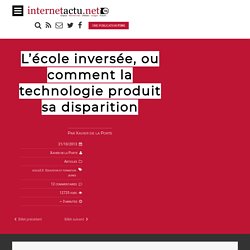
Une expérience narrée récemment dans le New York Times par Tina Rosenberg (@tirosenberg), et qui est le point de départ d’un mouvement qui porte le joli nom d' »école inversée » ou flipped school. Turning Education Upside Down. Fixes looks at solutions to social problems and why they work.
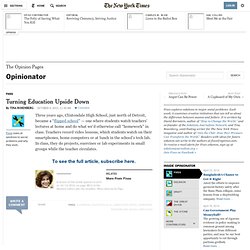
La face cachée des Moocs. Les Moocs font soudainement parler d’eux depuis que Harvard et le MIT se sont lancés fin 2012 dans l’aventure en créant ensemble edX, une nouvelle « plateforme » de Moocs, qui vise modestement, à terme, un milliard d’étudiants.
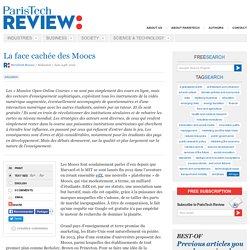
The False Promise of the Education Revolution - College, Reinvented. By Scott Carlson and Goldie Blumenstyk Last year, leading lights in for-profit and nonprofit higher education convened in Washington for a conference on private-sector innovation in the industry. The national conversation about dysfunction and disruption in higher education was just heating up, and panelists from start-ups, banking, government, and education waxed enthusiastic about the ways that a traditional college education could be torn down and rebuilt—and about how lots of money could be made along the way. During a break, one panelist—a banker who lines up financing for education companies, and who had talked about meeting consumer demands in the market—made chitchat. The banker had a daughter who wanted a master's in education and was deciding between a traditional college and a start-up that offered a program she would attend mostly online—exactly the kind of thing everyone at the conference was touting.
Read beneath the headlines a bit. Une étude officielle montre l'aggravation des inégalités sociales d'éducation. DEPP_EetF_2012_82_Conditions_scolarisation_facteurs_reussite_scolaire_237325.pdf (Objet application/pdf) Kids’ apps and ebooks can’t teach them to read without parent and teacher support. Photo by Christopher Furlong/Getty Images As touchscreen tablets become the hot holiday gift for children—even for tots still learning to walk and talk—parents can be forgiven for feeling a little confused and skeptical about this new trend, especially when it comes to claims about education. The iTunes App Store boasts more than 700,000 apps and, as the Joan Ganz Cooney Center discovered earlier this year, nearly 80 percent of the top-selling paid apps in the education category are aimed at children. Many of these apps make claims about helping children learn to read.
It’s an alluring promise—but are they all they are cracked up to be? As partners with the Campaign for Grade-Level Reading, a national coalition examining reading problems, we set out to answer those questions. Most of the top-selling reading apps appear to teach only the most basic of literacy skills. But apps aren’t the only problem. Comment réinventer l’éducation avec le numérique ? At this year’s Futur en Seine digital festival in Paris, Econocom presented the “classroom of the future” , a four-day workshop where visitors could experiment with digital text books, digital whiteboards and tablets, technology which is set to revolutionise teaching as we know it all over the world.
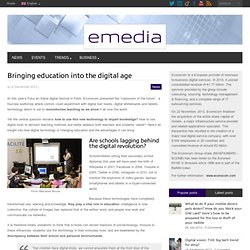
Yet the central question remains how to use this new technology to impart knowledge? How to use digital tools to reinvent teaching methods and better address both teachers and students’ needs? Here’s an insight into how digital technology is changing education and the advantages it can bring. Photo ©Benjamin Boccas Are schools lagging behind the digital revolution? The MOOC movement is not an indicator of educational evolution.
Somehow, recently, a lot of people have taken an interest in the broadcast of canned educational materials, and this practice — under a term that proponents and detractors have settled on, massive open online course (MOOC) — is getting a publicity surge.
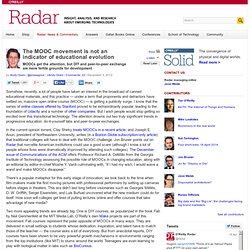
I know that the series of online classes offered by Stanford proved to be extraordinarily popular, leading to the foundation of Udacity and a number of other companies. But I wish people would stop getting so excited over this transitional technology. Harvard, Berkeley et le MIT lancent une plate-forme mondiale d'e-learning gratuite. MINES ParisTech - Presses DES MINES. 7 Essential Skills You Didn't Learn in College. Adieu diplômes, voici les badges. Why Learning Should Be Messy. The following is an excerpt of One Size Does Not Fit All: A Student’s Assessment of School, by 17-year-old Nikhil Goyal, a senior at Syosset High School in Woodbury, New York.
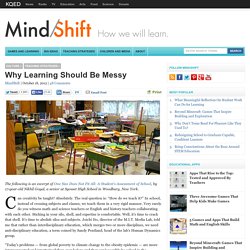
Can creativity be taught? Absolutely. The real question is: “How do we teach it?” In school, instead of crossing subjects and classes, we teach them in a very rigid manner. Very rarely do you witness math and science teachers or English and history teachers collaborating with each other. Duolingo Is a Crowdsourced Translation Service that Teaches French. Learning a new language is tedious and demands a lot of practice.
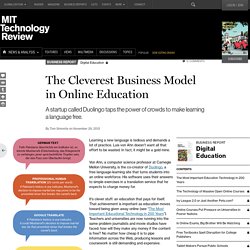
Luis von Ahn doesn’t want all that effort to be wasted. In fact, it might be a gold mine. Von Ahn, a computer science professor at Carnegie Mellon University, is the co-creator of Duolingo, a free language-learning site that turns students into an online workforce. Comment fabriquer de meilleurs profs. Comment améliorer le système éducatif américain?
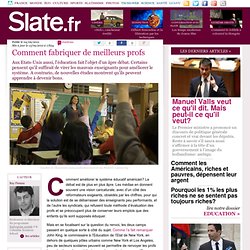
Le débat est de plus en plus âpre. Helping the World to Teach. And Harvard announce edX. Harvard University and MIT today announced edX, a transformational new partnership in online education.
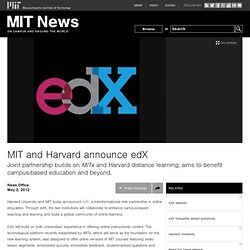
Through edX, the two institutions will collaborate to enhance campus-based teaching and learning and build a global community of online learners. EdX will build on both universities’ experience in offering online instructional content. The technological platform recently established by MITx, which will serve as the foundation for the new learning system, was designed to offer online versions of MIT courses featuring video lesson segments, embedded quizzes, immediate feedback, student-ranked questions and answers, online laboratories and student-paced learning. Certificates of mastery will be available for those who are motivated and able to demonstrate their knowledge of the course material.
MIT and Harvard expect that over time other universities will join them in offering courses on the edX platform. EdX: The Future of Online Education is Now. Khan Critiques: We Were Promised Jetpacks & Got Lectures - EdTech Researcher. Courses. Students in Free Online Courses Form Groups to Study and Socialize - Wired Campus. Map of Udacity meet-ups.
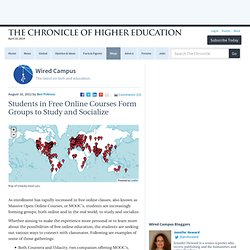
As enrollment has rapidly increased in free online classes, also known as Massive Open Online Courses, or MOOC’s, students are increasingly forming groups, both online and in the real world, to study and socialize. Whether aiming to make the experience more personal or to learn more about the possibilities of free online education, the students are seeking out various ways to connect with classmates. Les lois de la coopération. Recensé : Tom R. Les racines du désarroi de la jeunesse. Le gouvernement entend imposer des quotas d'étudiants boursiers dans les «grandes écoles» et se heurtent à une forte opposition de ces institutions.
Les «grandes écoles», spécificité du système français d'éducation supérieur, qui seraient aujourd'hui le principal vecteur de la reproduction des élites et du blocage de l'ascenseur social, n'entendent pas pourtant changer de modèle. Nous republions à l'occasion de ce débat un article, mis en ligne en mars 2009, de Monique Dagnaud sociologue et directrice de recherche au CNRS, sur le désarroi de la jeunesse française face à l'absence de toute ouverture de son système d'éducation et notamment de la filière classes préparatoires-grandes écoles. La discrimination positive et l’égalité des chances. Quand les étudiants doutent du mérite. 5 Startups Transforming Online Education. Zev Gotkin is an entrepreneur and founder of L'Mala, a writing firm specializing in website content development, blogs, branding, and social media promotion.
He can be reached at wgotkin@gmail.com. As the global economy continues to shift, there's an increased demand for services in higher education. This fact, coupled with the rise of technology, is bringing many of these options online. These services are only being spurred on by the more than one billion people who have joined the middle class in the last decade. In fact, in the next eight years, 150 million people will seek higher education. This leaves entrepreneurs with the opportunity to create exciting new ways for individuals to learn online. 1. 2tor 2tor is the first startup of its kind to offer full degree programs online at top-tier universities. 2tor partners with universities across the country to help them build and market their own online degree programs.
Udacity - 21st Century University. John L. Hennessy: Risk Taker. Photo: Gabriela Hasbun 2012 IEEE Medal of Honor Recipient John L. Hennessy In the 1980s, John L. Hennessy, then a professor of electrical engineering at Stanford University, shook up the computer industry by taking the concepts of reduced instruction set computing (RISC) to the masses. Quand les enseignants innovent… Peut-on apprendre en ligne. A TED 2011, Salman Khan est venu présenter la Khan Academy, une collection soigneusement structurée de plus de 2000 vidéos éducatives (voir la présentation vidéo avec sous-titres en français).